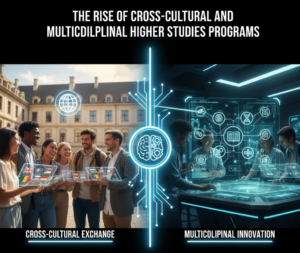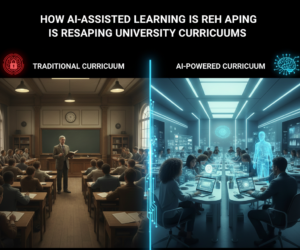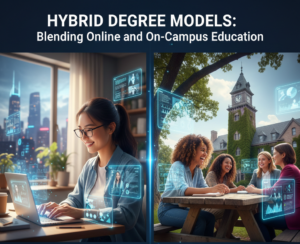How Universities Are Preparing Students for Employment Opportunities That Do Not Currently Exist

How Universities Are Preparing Students for Employment Opportunities That Do Not Currently Exist
It was only a short time ago that the fields of social media management, app development, and data science did not have any job opportunities available. These occupations are critical in today’s world. There are a great number of jobs that will be highly sought after in the future that have not yet been formed. This is due to the fact that the employment market is always being reshaped by ongoing advancements in technology, globalization, and cultural transformations. This fact brings up a significant question: how can institutions train students for positions that do not yet exist? The solution rests in developing abilities that can easily be adapted to new situations, stimulating learning across several disciplines, and building a mentality that prioritizes lifetime progress.
1. The Challenges Presented by an Unpredictable Job Market
According to estimations made by the World Economic Forum, a considerable number of the pupils who are now enrolled in elementary school will someday be employed in professions that do not yet exist. The unpredictable nature of the modern world requires colleges to provide students with more than just instruction that is tailored to a particular career. Rather, universities must provide students with adaptable instruments that will enable them to navigate change.
2. Placing Emphasis on Skills That Can Be Transferred
Universities are placing a greater emphasis on transferable skills, which include communication, problem-solving, leadership, and flexibility, rather than focusing on training students for one specific job. These abilities are relevant across a wide range of sectors, guaranteeing that graduates will stay employable even as the landscape of the job market continues to change.
3. Placing an Emphasis on Creativity and Critical Thinking
While artificial intelligence and automation are assuming control of regular jobs, abilities that are unique to humans continue to be essential. Universities are providing greater opportunity for students to evaluate, question, and create, whether via debates, design projects, or creative problem-solving workshops.
4. Interdisciplinary Programs as a Way to Move Toward the Future
In order to deal with contemporary difficulties, it is sometimes necessary to have competence in a variety of subjects. Universities are increasing their interdisciplinary programs, which allow students to integrate courses such as computer science and biology, or economics and environmental studies, into a single course of study. Graduates are prepared for the new hybrid occupations that are beginning to emerge thanks to these adaptable curriculum.
5. Learning via Experience and Exposure to Real-World Situations
Students are given the opportunity to engage on initiatives that are relevant to the real world via internships, cooperative education, and industrial collaborations. This practical experience provides students with exposure to new trends, assists them in developing professional networks, and aids them in cultivating resilience in work contexts that are unpredictable.
6. Entrepreneurial Education and Innovation Hubs
Startup incubators and entrepreneurship programs are receiving investments from a large number of colleges and institutions. These programs stimulate graduates to start new businesses and sectors from scratch rather than just adjusting to those that already exist by instructing them on how to recognize possibilities, develop business models, and manage risk.
7. Incorporating Technology Into All Fields of Study
Digital fluency is no longer a skill that one may choose to acquire or not. Data analysis, coding, and digital technologies are being included into the curriculum of all disciplines at universities, ranging from the sciences to the humanities. This guarantees that graduates, no matter what discipline they specialize in, have the opportunity to succeed in occupations that are centered around technology.
8. Developing a Global Competence and an Awareness of Different Cultures
Working in future professions will need people to collaborate with others across international boundaries. In order to better prepare students for the realities of a globalized work world, universities are actively promoting study-abroad programs, research collaborations with foreign institutions, and cross-cultural training initiatives.
9. Promoting the Pursuit of Learning Throughout One’s Entire Life and Micro-Credentials
Education cannot stop after graduation since professions are going to continue to develop. Graduates are able to reskill or upskill throughout their life because universities are providing flexible learning routes, such as micro-credentials, certificates, and online courses.
10. Preparing Students for Remote and Hybrid Work Models
The surge in remote work has proven that a significant number of positions are no longer dependent on physical locations. Students are being trained in the abilities of virtual collaboration, digital communication, and project management by universities, which are all necessary talents for distant teams to have.
11. Broadening the Emphasis on Social Responsibility and Ethical Principles
As technology continues to improve, ethical concerns are becoming ever more complicated. In order to guarantee that professionals of the future will be able to successfully maneuver ethical dilemmas in emerging businesses, universities are including courses that focus on sustainability, ethics, and social responsibility into their curriculum.
12. Developing Emotional Intelligence and Soft Skills
Emotional intelligence is essential for graduates who want to be successful leaders, collaborators, and adapters, even while technical talents may help them get their foot in the door. In order to provide a boost to these essential characteristics, universities are beginning to include leadership seminars, cooperation exercises, and mentoring programs in their curricula.
13. Fostering flexibility in academic pathways
Rigid degree programs are being replaced with flexible curricula that enable students to customize their education to suit their own needs and interests. The flexible nature of future jobs is reflected in the options that are available to students, such as double majors, minors, electives across fields, and self-designed programs.
14. Industry Collaboration to Anticipate Emerging Needs
In order to predict trends in their respective industries, universities are increasingly forming partnerships with corporations, technology companies, and government organizations. Collaborations of this kind are crucial in shaping curriculum around skills that are anticipated to be in high demand, giving graduates a head start on developing vocations.
Although it may be difficult to anticipate what the vocations of the future will be, institutions of higher education are not remaining stagnant. Higher education involves getting students ready to succeed in a world where the only thing that remains the same is the fact that things are always changing. This is accomplished by placing an emphasis on critical thinking, interdisciplinary learning, flexibility, and development that continues throughout one’s lifetime. The most effective method of preparing for employment opportunities that have not yet been created is not to provide training for particular positions. Instead, it is to develop resilient and creative thinkers who are capable of inventing, adapting, and leading in a future that is full of uncertainties.




